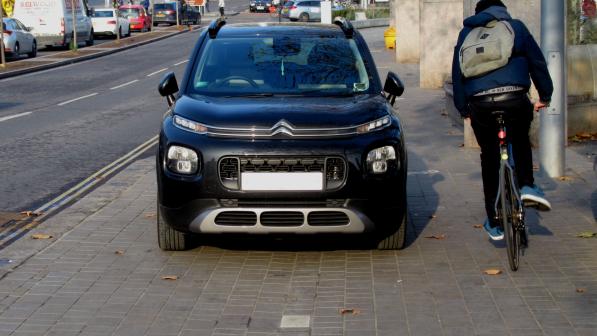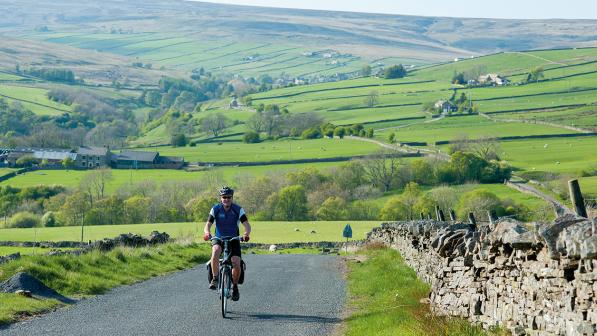Cycling against the tide: Why I love cycling
The conversation starts when I fill in a form at hotel check-in. I cross out ‘CAR REGISTRATION’ and write ‘BICYCLE’. I don’t have a car, I explain. Yes, I can drive, and I’ve got a full clean licence, though I only use it as ID. The bike’s how I get around town – and, with the addition of a train, around the country, for my work. It’s easy, cheap, quick and convenient. Anyway, then comes the same series of questions: "Do you cycle because it saves the planet?" No. I suppose it does. But that’s not why I cycle. "Do you cycle because it saves you money, then?" No. I suppose it does. And not having had a car for twenty years must have saved me over fifty grand, though I’m not sure where it’s gone. But that’s not why I cycle. "Do you cycle because it keeps you fit, then?" No. I suppose it does. Sometimes. It’s said that regular cyclists enjoy fitness equivalent to non-cyclists ten years younger. But usually, cycling is a zero-sum calorie game. Cycling and cake is a thing, for good reason. I can’t pass some road signs without thinking of food...

"So why do you cycle?" My answer is because it’s fun. The best fun you can have while vertical, except for riding a recumbent, I suppose. Because I’d rather be on a bike, moving at my own pace, feeling in control and alive, than sat in a car complaining about ‘the traffic’.

Shopping
I’d rather go shopping on a bike than by car. Panniers can take a week’s groceries no problem, and for special runs like this, there’s bike trailers. York, where we live, has parks and rivers and nature reserves on the way to those out-of-town retail complexes, so we make every shopping trip a mini-adventure, a micro-tour. And don’t worry about the plastic bottles. It all gets responsibly recycled – by bike, thanks to York’s facility being on a bike route. I’ve recycled all sorts this way thanks to that trailer. Fridges, computers, furniture, mattresses – saving £40 a time over council collection fees. The facility even has its own cyclist entrance. And it’s opposite a supermarket, so the trailer doesn’t have to be empty on the way back.

It is a miracle?
Cheap, healthy, socially responsible, but above all fun – cycling is a miraculous activity. As proof, I actually cycled on water in Northumberland (see photo below), it's the causeway to Lindisfarne – Holy Island – so it’s a place familiar with the wondrous. The causeway floods with every high tide. Time it right – ideally when the tide’s going out, and near the safety of the mainland – and you can skim across the waves like this. Time it wrong and you end up stranded in a little wooden hut, the refuge for the careless, with nothing to read except a business card for a taxi firm. Which is of limited use when you’re a quarter of a mile out to sea with no signal.

Flood

Sometimes floodwaters are less predictable. The 2015 Boxing Day floods in York where I live were a stark reminder. Flooding is getting worse and more frequent: maximum levels have risen by 60cm over the last century and are forecast to jump another 100cm in the next. It’s down to many factors, including building policy and land management up in the Dales, but climate change is making things worse. So I’m taking no chances. This is one of my folding bikes, toting my inflatable canoe, by the Ouse in York. I can inflate the boat, fold down the bike and put the bike inside the boat. Which means, whatever the water levels, I should still be able to get to the supermarket and back.

Creating a cycling culture
I visited Copenhagen. I wish it was York. Around half of all journeys in the Danish capital are made by bike. Partly that’s thanks to good infrastructure – wherever you’re heading in town, there’s probably a decent, safe cycle route there, often segregated from traffic. But that’s not the only reason. Mostly it’s because there’s a cycling culture: people cycle because people cycle. And streets filled with cyclists make for a much more pleasant city, a more personal, human one. Denmark’s weather is no better than the UK’s. But it clearly hasn’t put off this lot. They’re all smiling – which happens to be my default expression when cycling, too.

Car-free city centres will inevitably increase as we tackle the problems of congestion, pollution and climate change. Many cities, such as Birmingham, Oxford, Bristol and York announced intentions in early 2020 to move this way. But this is not a loss of amenity, a threat to the economy, or a terrible public trial to be endured. It’s an opportunity to make our cities thrive better.

Here’s the Millennium Bridge in York. Opened in 2000, it forms an essential transport link over the Ouse between the University, and the residential and trendy ‘Bishy Rd’ and the South Bank. But it’s also a social space. People sit on the bench running along one side of the bridge, having picnics, stopping for a chat, or just watching the boats and cyclists go by. It’s a great place for spotting bikes: recumbents, hand-cycles, tandems, tagalaongs, cargo bikes... even trailers with mattresses. Design for cyclists, pedestrians and non-motorised traffic in general, and you automatically design a pleasant, liveable town or city. So this is why I cycle. It’s simply the best way to get around urban space: friendly, low-impact, sociable – and a joy, every day of my life.


